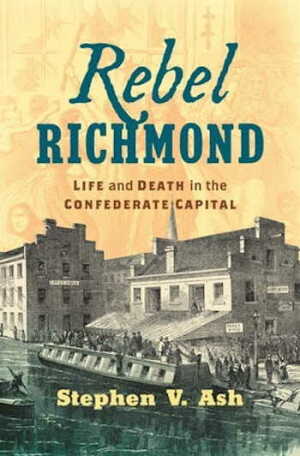Rebel Richmond
Life and Death in the Confederate Capital
Stephen V. Ash
Even before the Civil War, Richmond, Virginia was a prominent and distinctive city. The most industrialized city of the South, and one of the largest and most ethnically diverse, it managed to be entrepreneurial and forward looking in a way that belied the stereotype of the old South while remaining thoroughly committed to slave-holding and to the preservation of an antiquated social hierarchy. Yet it was unprepared for the level of tumult that would ensue when, in the spring of 1861, it was designated the capital of the newly-created Confederate States of America.
Soon, the city’s population exploded. Men and women flooded the city, looking for work in government jobs and seeking favors from officials. They worked in the war industries, and staffed the military and the hospitals. These newcomers were joined, over time, by refugees who fled Union-occupied parts of the South. This rapid growth transformed the city and introduced tensions that reflected what was happening in the nation at large.
In Rebel Richmond: Life and Death in the Confederate Capital, Stephen V. Ash tells the story of how a city copes with living amidst the maelstrom of war. He introduces people whose stories have heretofore been lost, and in so doing, shows how people of all races, classes, and genders shaped what happened in Richmond.
What happened there mattered, to the course of the war and to the way it was understood by people across the country and the world. Rich in historical sources, Rebel Richmond offers a moving account of a world in flux.
Published by University of North Carolina Press
Praise for Rebel Richmond
Deeply researched, revealing, and compelling. . . . Will set the standard for other much-needed intensive, close-up examinations of what the Civil War meant on the ground.
— Library Journal
Ash rightly concludes that the most noteworthy change in Richmond after April 1865 was the absence of slavery, “radically altering the city’s social, economic, and political landscape.” That landscape is evolving to this day.
— America’s Civil War
Outstanding. . . . From the arrest of an African American bartender who allegedly spoke to a white man with “insolent and provoking language” to hospital matrons’ attempts to brighten their dreary living quarters, Rebel Richmond compellingly illuminates how Richmonders lived, labored, and died in a city where the war sometimes reached the suburbs and was never far away.
— H-Net Reviews
